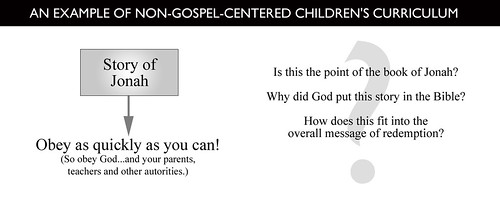 Unfortunately, this gospel-centered emphasis appears to be a rare commodity in children’s curriculum which far too often devolves into mere moralism – Sesame Street with a little Jesus sprinkled on top. Every Sunday in churches all across America kids are given the impression by children’s ministries that the main reason God gave the Bible is to teach them “how to” live – how to tell the truth, how to obey mommy and daddy, how to work hard and make good grades, how to develop the right friends – instead of it being the story of how God has come in Jesus to do for us what we cannot do for ourselves (i.e., the gospel).
Unfortunately, this gospel-centered emphasis appears to be a rare commodity in children’s curriculum which far too often devolves into mere moralism – Sesame Street with a little Jesus sprinkled on top. Every Sunday in churches all across America kids are given the impression by children’s ministries that the main reason God gave the Bible is to teach them “how to” live – how to tell the truth, how to obey mommy and daddy, how to work hard and make good grades, how to develop the right friends – instead of it being the story of how God has come in Jesus to do for us what we cannot do for ourselves (i.e., the gospel).
Based on my observations, here is a typical approach to children’s curriculum:

You’ll note from the graphic that the children’s lesson usually is a biblical story that has been ripped from its redemptive historical context. This isolated story is then boiled down into a morality tale – a biblical Aesop’s Fables, if you will – where children are called to do the right things. Often these teaching series are organized by the moral application instead of the stories connection to the larger narrative of redemption. Having children exclusively diet on this kind of teaching may lead them to a disjointed understanding of these stories where they see in them little to no attachment to the larger gospel picture.
Here’s an example:

Here we see the story of Jonah as the teaching for Sunday. The moral of Jonah is to obey as quickly as you can. “Don’t be like Jonah who got swallowed by a fish for not obeying as soon as possible! This teaches us we should obey God the first time. Accordingly, we should obey our parents the first time. And our teachers. And other people God has put in authority over us. If we don’t, bad things can happen to us.” Sound farfetched or like last week’s lesson at your church? Just so you know, I took this example from a very well-known and prevalent children’s curriculum.
This type of moralistic interpretation of biblical narratives should lead us to ask questions like:
• Is this the point of the book of Jonah?
• Why did God put this story in the Bible?
• How does this story fit into the overall message of redemption?
Asking those questions might lead someone to discover a different purpose for Jonah – like how it reveals God’s heart for salvation and that anyone (the Assyrians in Jonah’s case) has an opportunity to be forgiven, even if they’re people you struggle to care about. Needless to say, this understanding of Jonah would easily highlight the beauty and worth of Jesus and the gospel.
Would Jonah have spared himself a lot of trouble if he had just been obedient? Absolutely. Do I want my children to exhibit these same characteristics in their own lives? Without a doubt. But the question becomes what is the real reason God wanted these stories in the Bible? Could it be that the things we often focus on in teaching children bible stories are secondary truths, supporting details instead of the main idea? Could it be that instead of giving our kids the life-giving truth of Jesus each week, we have mistakenly given them moralism; something that never grows a heart for Christ but does quite the opposite.
Are we giving kids the good news or just good advice?

2 thoughts on “Gospel-Centered Children’s Curriculum – Part 2”
Totally agree with you on this… my biggest challenge as a preschool teacher is to make these stories accessible and appropriate. Do we talk about God intending to destroy (kill) the people of Ninevah with two-year-olds? It seems really difficult to me to talk about salvation without talking about destruction – and maybe shying away from that is part of our problem. When does the negative (but essential) aspect of the gospel become OK? We tend to gloss over the drowning of the world’s population when we tell the story of Noah’s Ark, but doesn’t that deletion belittle the amazing salvation that God provided to Noah and his family? Maybe you’ll address this struggle in your next few segments – I’m tuning in daily and enjoying your thoughts. 🙂
Mandy, you have a good question: How can you tell the story in an age-appropriate manner without gutting the story? I think ultimately it will be a question only discernment can answer best. It is easier when I talk to my own kids since I determine the boundaries for them; it’s much harder when I have to deal with someone else’s children when I have no clue what their parents have deemed as acceptable content. As far as children’s ministries are concerned, I do think this is a decision that should be made first by the leadership and then finding consensus with those involved in the ministry.
Wow, great question!